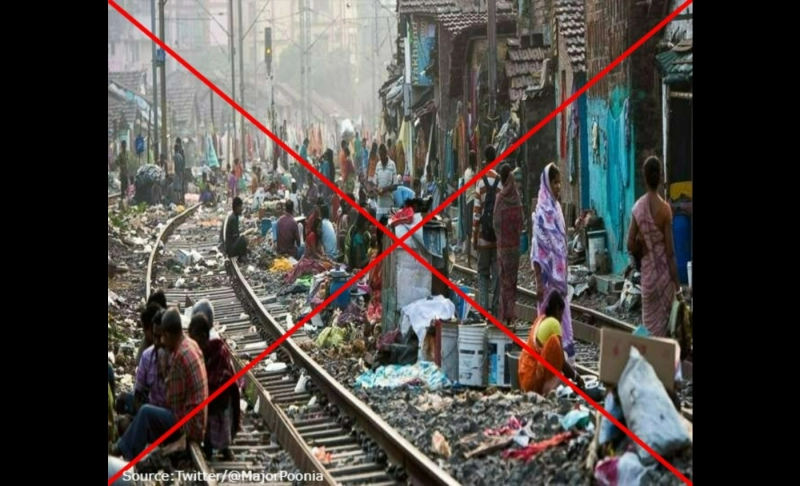By: Annie Priya
January 9 2023

The image used in the post is not from Haldwani. A 2013 photograph from Kolkata has been shared as homes along the railway line in Haldwani.
Context
On December 20, 2022, the Nainital High Court ordered the removal of more than three thousand houses, which were encroaching on tracks near Haldwani railway station. The impending demolition drive triggered a huge protest by local residents. The issue drew national attention, and many political parties opposed the decision to demolish residents' homes without providing the 4,000-odd residents with rehabilitation. Later, a PIL was filed in the Supreme Court against the demolition, and the Supreme Court stayed the High Court's direction to demolish the encroachments. Following this, several misleading and dated images and videos have started circulating on social media, with users linking them to the Haldwani encroachment.
Many users have shared one such image on social media of a settlement near railway tracks, claiming that it is from Haldwani. In the image, people can be seen walking along a railway line, and others are sitting on the tracks. Bharatiya Janata Party (BJP) leader, Priti Gandhi shared this image with the caption "This is what the Supreme Court has legitimized today," with the hashtag #HaldwaniEncroachment. This tweet received 5,430 retweets and over 17.3K likes. It was also shared by former Special Forces officer of the Indian Army, Major Surendra Poonia, who has over 638k followers on Twitter.
Another Twitter user named Surya Thakur shared a 45-second video clip in which settlements can be seen along a railway line, with clothes drying lines set up between the tracks. The user shared the video with the caption, "Yesterday #SupremeCourt said this is Ok. These people have clearly encroached on the railway land and rail lines. I don't have any faith in #SupremeCourtofIndia and @BJP4India Uttrakhand." Another user with the handle "FFHack07" posted a similar video, with the claim, "Here's a glimpse of the illegal Encroachment done by Rohingyas near haldwani (sic)," which has been viewed over 15k times.
However, the visuals used in these posts are old and unrelated to the recent Haldwani issue.
In Fact
By conducting a Google reverse image search, we found that the image being passed off as Haldwani is an old stock image first uploaded on Getty Images in 2013. The image description under the photograph reads, "People get on with their lives in a slum on the railway tracks as a commuter train goes past on December 12, 2013, in Kolkata, India." The image was captured by London-based photographer Samir Hussein.
Logically also conducted a reverse image search of a screenshot from the video that has also gone viral connected to the Haldwani encroachments. The search revealed that the video is from 2017. A longer version was posted by Sukamal Chakraborty on his YouTube channel on January 13, 2017, with the caption stating that the video was taken in Kolkata.
At the beginning of the viral video, we can see a poster of West Bengal Chief Minister Mamata Banerjee outside a home. While the exact location of the video has not been mentioned in the description, the video contains many visual cues that indicate that the video is from Kolkata.
Additionally, a train passes by the camera in the longer video with the word "Eastern" on it, indicating that it is an "Eastern Railways" train. The color of the train is similar to that of the outdated versions of Kolkata suburban's EMU local train. This indicates that the video was taken in West Bengal and not in Uttarakhand.
The Verdict
The viral image and video linked to the Haldwani encroachment issues are old visuals from West Bengal and have been shared with a misleading claim. Therefore, we have marked this claim as false.